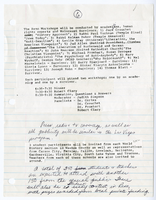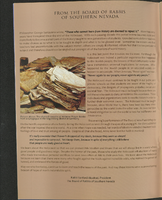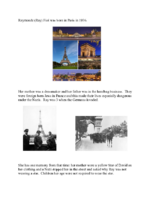Search the Special Collections and Archives Portal
Search Results

Grant Application to the Nevada Humanities Committee, circa 1984
Date
Archival Collection
Description
Grant Application to the Nevada Humanities Committee, Inc. for the Nevada Student Conference on the Holocaust and Human Rights.
Text
Wall of Hope Portraits
Identifier
Abstract
The collection is comprised of sixty-four black-and-white digital photographs of Holocaust survivors who live in Las Vegas, Nevada. The photographs were taken by Lyn Robinson in 2012 for a photographic exhibit, the Wall of Hope. The permanent exhibit is on display at the Sperling Kronberg Mack Holocaust Resource Center in Las Vegas, Nevada.
Archival Collection

Program, The Memory Book accompanying The Diary of Anne Frank premiere performance, February 2009
Date
Archival Collection
Description
This program accompanied the performance of the Broadway adaptation of the Diary of Anne Frank by the Nevada Conservatory Theatre. The program was produced by the Jewish Family Service Agency. It includes biographies of survivors living in Southern Nevada and an educational guide.
Text

Transcript of interview with Doug Unger by Barbara Tabach, August 26, 2014
Date
Archival Collection
Description
Interview with Doug Unger by Barbara Tabach on August 26, 2014. In the interview, Unger discusses his schooling, his family's mattress business, and his endeavors in the company and the mattress industry in Las Vegas. Unger becomes involved in Holocaust education and the Sperling Kronberg Mack Holocaust Resource Center.
Doug Unger was born in Cleveland, Ohio, and grew up working summers in a mattress factory, a family business started by his maternal grandfather. After graduating from high school in Cleveland, Doug attended the University of Cincinnati until moving to Steamboat Springs, and enrolled in Denver University, though ended his college career one class away from graduation. Eventually, Unger moved back to Cleveland, then to Las Vegas. In 1976, Dough bought Supreme Mattress and moved to Las Vegas to build his new business. Outside his successful career, Doug was always an active member in the city's Jewish community. He joined Congregation Ner Tamid, where he was a trustee. He became involved with the Jewish Federation, serving as treasurer and later as president. When he moved to Reno, Doug joined Temples Sinai and Emanu-el, and also became heavily involved with Guide Dogs for the Blind Friends Committee, serving as its director for a period of time. He was also the co-chair of the Governor's Advisory Council on Education Related to the Holocaust (GAC). Doug was instrumental in establishing the Library for Holocaust Studies as a successful organization, independent of the Jewish Federation. The Library is now located in its own, donated space, run by trained staff, and receives $200,000 from the state biennially.
Text
International Relations: hearing and letters, Africa, Albania, Armenia, Belarus, China, Cuba, Cyprus, Egypt, Europe, Georgia, Greece, Guatemala, Hungary, India, Iran, Iraq, Israel, Japan, Kazakhstan, Kosovo, Libya, Macedonia, Pakistan, Russia, Saudi Arabia, Sudan, Syria, Taiwan, Turkey, United Arab Emirates, Ukraine, United Kingdom, anti-semitism, constituent work, foreign aid, Holocaust, religious freedom, travel, United Nations, 2007-2012
Level of Description
Archival Collection
Collection Name: Shelley Berkley Papers
Box/Folder: Digital File 00
Archival Component

Transcript of interview with Lyn Robinson by Barbara Tabach, September 18, 2014
Date
Archival Collection
Description
One day in 2012, UNLV student Lyn Robinson spied a posting on the bulletin board for a photographer for the Sperling Kronberg Mack Holocaust Resource Center. She was an art major with a concentration on photography. She was also had a deep appreciation of the horror of the Holocaust and what the survivors she would take photos of had endured. Thus began a two year project, during which she took photos of over sixty survivors. Her images are preserved at UNLV Special Collections & Archives. Prints are displayed at the Sperling Kronberg Mack Holocaust Resource Center. On September 18, 2014, Lyn shared her work for this oral history recording. She is a native of Florida, daughter of a horticulturist father and pianist mother.
Text

Biographical essay about Raymonde Fiol, 2014
Date
Archival Collection
Description
Ray Fiol is the daughter of Holocaust victims who died at Auschwitz-Birkenau. Fiol was smuggled out a labor camp and protected by a French family during the war.
Text
Raymonde Fiol oral history interview
Identifier
Abstract
Oral history interview with Raymonde Fiol conducted by Barbara Tabach on August 12, 2015 for the Southern Nevada Jewish Heritage Project. Fiol discusses surviving the Holocaust and moving to Las Vegas, Nevada in 2001. She also discusses her time serving as president of the Holocaust Survivors local organization since 2010, and making improvements on Holocaust education in local schools.
Archival Collection
Henry and Anita Schuster Papers
Identifier
Abstract
Collection is comprised of correspondence, speeches, essays, meeting minutes, photographs, research materials, publications, press clippings, awards, and event programs (1941-2011) that document the life of Henry Schuster, and his work with his wife Anita. Materials are mainly related to the Holocaust and to Holocaust memory and survivor organizations (especially the Holocaust Survivor's Group of Southern Nevada, which the couple founded, and L’Œuvre de Secours aux Enfants). Genealogical information is also included, as well as records of Henry Schuster’s time in the U.S. Army and his studies at the Manhattan Technical Institute.
Archival Collection

